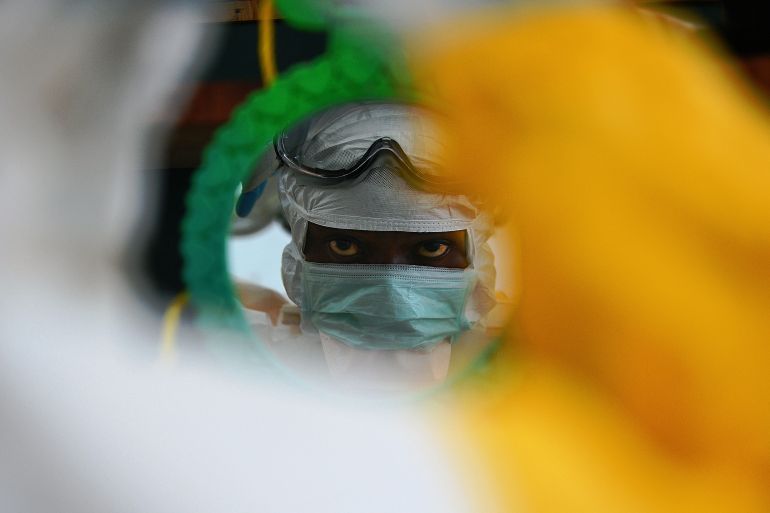Guinea races to trace contacts after Ebola deaths
Health minister says priority to conduct rapid contact-tracing after seven reported cases, including four deaths.

Guinea is tracking down people who potentially came in contact with Ebola patients and will distribute vaccines as soon as it can get them, Health Minister Remy Lamah said on Monday, as the death toll from the new outbreak rose to four.
The West African country declared a new Ebola epidemic on Sunday after confirming seven infections.
Keep reading
list of 3 itemsWHO to probe sex abuse by aid workers in DRC amid Ebola outbreak
DRC confirms third Ebola case in North Kivu province
The Ebola virus causes severe vomiting and diarrhoea and is spread through contact with body fluids.
Lamah said unlike the deadliest known outbreak which tore through West Africa during 2013-16, Guinea now had the means to halt the resurgence of the disease.
“In 2013, it took us months to understand that we were dealing with an Ebola epidemic, while this time, in less than four days, we were able to do analysis and have the results. Our medical teams are trained and seasoned. We have the means to quickly overcome this disease,” Lamah told the Reuters news agency.
The 2013-16 outbreak killed 11,300 people, mostly in Guinea, Sierra Leone and Liberia. The second-deadliest known outbreak was declared over last year in the Democratic Republic of the Congo (DRC), but the country launched a vaccination campaign on Monday after it recorded new Ebola cases this month.
The resurgence in Guinea started after the funeral of a nurse who was buried in country’s southeast on February 1. Authorities said seven people who took part in the funeral fell ill and tested positive for Ebola. Four have died, while four others are in isolation.
Lamah did not say how many potential contacts health officials were trying to trace.
“As a priority, we are trying to trace all potential contacts to isolate them. At the same time, we will carry out a vaccination campaign in the locality, as soon as the doses are available,” Lamah said.
“What worries us the most is the dangerousness of the disease given what we experienced five years ago. We do not want to relive such a situation,” he added.
‘Regional risk’
Authorities including in neighbouring Sierra Leone are concerned that the disease could quickly spread in the area where borders are porous.
A spokesman for Sierra Leone’s health ministry said on Monday workers were on the ground at points of entry, performing surveillance in coordination with the Guinea authorities.
Lamah said the government had received assurances from the World Health Organization that it will help it get vaccines, as doses stored from the previous outbreak had expired.
International health charities have pledged immediate action to support the government’s efforts to stop the spread of the virus.
“The MSF team in Guinea is rapidly putting together an Ebola team to support the Ministry of Health’s Ebola response,” Frederik van der Schrieck, Doctors Without Borders (MSF) head of mission in Guinea, said.
“We know from the past that the speed of response is important, to try to contain the transmission and provide treatment for people who have caught the disease.”
Meanwhile, an Ebola vaccination campaign began in the city of Butembo, in the eastern DRC, the World Health Organization (WHO) said in a tweet on Monday.
Health workers at Matanda health centre, where the first Ebola patient was treated, were the first to be vaccinated, the WHO said.
The DRC has confirmed four cases of Ebola since a resurgence of the virus was announced on February 7 in Butembo, the epicentre of a previous outbreak that was declared over last June.
On Friday, 1,200 doses of Ebola vaccine and cold chain equipment arrived in the city, according to the WHO.
The oubreak in DR Congo and Guinea poses a regional risk that requires exceptional vigilance, a senior World Health Organisation official said on Monday.
“We have to be exceptionally vigilant, highly alert”, Mike Ryan, WHO’s top emergency expert, told a news briefing. “This disease (Ebola) represents a regional risk.”